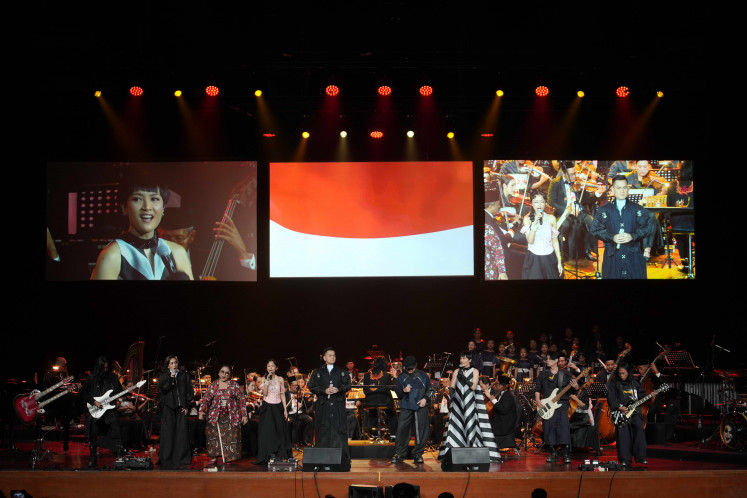Popular Reads
Top Results
Can't find what you're looking for?
View all search resultsPopular Reads
Top Results
Can't find what you're looking for?
View all search resultsOf 'noken' & 'koteka' in Timika
For sale: This picture of a bird of paradise on goat leather is priced at Rp 300,000 (US$25
Change text size
Gift Premium Articles
to Anyone
For sale: This picture of a bird of paradise on goat leather is priced at Rp 300,000 (US$25.05) at a souvenir kiosk in Timika.
Last December, UNESCO added a unique Papuan handicraft to its list of cultural heritage objects: The noken, a traditional bag made from woven or knotted bark used for carrying things ranging from groceries to babies.
In Timika, the capital of Mimika regency, residents can be seen carrying the bags, which can hang from the neck, shoulders or even the head. A noken's shape and the way it is used vary according to ethnic groups.
If you are looking for noken to take back home, go to Jl. Ahmad Yani in Timika, where eight kiosks sell various Papuan handicrafts, including the famous bags, which are on display in a host of different designs and colors.
Tight fit: The kiosks are small and packed with a wide variety of souvenirs, leaving customers with limited browsing space.
One stall belongs to Senanti, 35, a Bugis who left Makassar, South Sulawesi, 12 years ago to settle in Timika. According to the woman, noken are her best sellers, although she frequently lacks stock.
'The supply of noken and koteka has been less frequent for almost a year now, making prices soar,' Senanti said. 'I'm not sure about the cause of the scarcity, but we can only expect the supply from craftsmen in Wamena.'
There are two kinds of noken on sale on Jl. Ahmad Dani.
The genuine article, made from the bark or leaves of the ganemo tree, are generally light or dark brown without motifs and are sold for Rp 200,000 (US$16.70) or more.
The second type, woven from red, green, yellow and black nylon yarn, sell for about Rp 65,000.
The Papuan people consider noken symbols of an enjoyable life, peace and fertility. Representing the womb, noken are only woven by women. Papuan women incapable of crafting bark into noken are seen as ineligible for marriage.
Meanwhile, koteka, or penis sheaths, are also on offer at Senanti's stall, although meager demand in Timika and other big towns where men have abandoned wearing the sheath, have driven prices up.
Ouch: Koteka hang from a kiosk on Jl. Ahmad Yani in Timika. Supplies of penis sheaths have been low in recent months, the vendors report.
'I used to sell koteka for just Rp 25,000 a piece,' Senanti said. 'Now, even if sometimes it fetches as much as Rp 70,000, the profit is only Rp 10,000 because the wholesale price is already Rp 60,000.'
The sheaths, made from dried gourds, are now typically used only during ceremonial occasions, such as the bakar batu, or stone-burning ritual.
During the bakar batu, rocks are heated and used as ersatz ovens to bake various foods such as tubers and meat until they are ready to serve.
Another souvenir seller is Guntur, a Bugis born in Jayapura, the capital of Papua, 32 years ago. His parents are longtime residents of the province.
At work: Another souvenir seller is Guntur, a Bugis born in Jayapura, the capital of Papua, 32 years ago. His parents are longtime residents of the province.
Guntur says he has been selling merchandise since 2010 out of a kiosk that he rents for about Rp 25 million a year.
'If handicrafts are offered at lower prices, I buy them for retail sale. But if the prices are very high, craftspeople usually consign their products to my shop, and I earn some percentage of their sales when the items are sold,' said Guntur.
Guntur's kiosk, measuring four meters by six meters, is packed with a wide variety of souvenirs, leaving a small space for customers to look.
Shopping: Buyers select necklaces and bracelets.
Bigger and heavier objects such as statues sit on the floor, while smaller items such as noken, koteka, bracelets and necklaces hang on the walls.
On sale for around Rp 1 million are shoulder-high wooden statues crafted by the province's Komoro people, while wooden masks range in price from Rp 800,000 to Rp 2 million.
For sale: This picture of a bird of paradise on goat leather is priced at Rp 300,000 (US$25.05) at a souvenir kiosk in Timika.
Meanwhile, hats adorned with the feathers of the many species of birds of paradise found in Papua sell for about Rp 2.5 million, and wooden tifa drums cost Rp 200,000 per set of four.
'I can't determine the amount of my daily turnover,' Gunter said. 'Sometimes it's more than Rp 10 million a day '
especially when there's a lot of Western tourists visiting my shop. But there are times when none of my merchandise sells for a week.'
One tourist from Kalimantan, Matheus Tain, 29, said he travelled by air for seven hours to reach Timika and was eager to buy souvenirs for himself and his family.
'I heard that the noken had been recognized as an object of the world's cultural heritage. Although I'm not a native of Papua, I'm very proud of it,' the architect said.
' Photos by JP/Severianus Endi
















